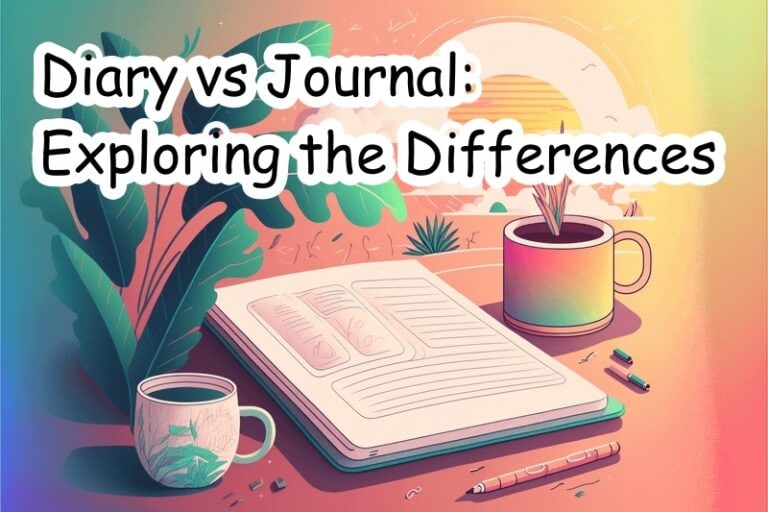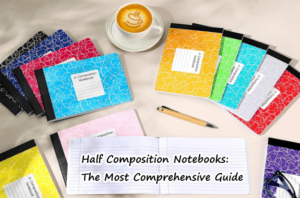In the fast-paced world we live in, finding ways to express our thoughts, experiences, and emotions can be incredibly therapeutic. Two popular methods for doing so are keeping a diary and maintaining a journal. At first glance, they might seem identical, but there are nuances that set them apart. In this comprehensive guide, we’ll delve into the distinctions between a diary and a journal, helping you choose the one that best fits your needs.
1. Defining Differences: Diary vs Journal
In the world of personal expression and self-reflection, diaries, and journals are two popular tools often used interchangeably. Both offer a means of recording your thoughts, experiences, and emotions, but they serve distinct purposes. Let’s look at the differences between “diary” and “journal” based on their dictionary definitions.
Diary:
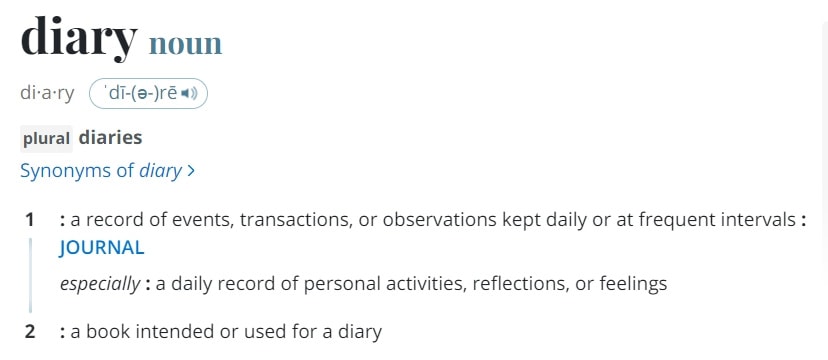
A dictionary definition of a diary might describe it as a daily record of personal experiences, thoughts, and feelings. It often focuses on the events of each day, recorded in a chronological and personal manner. Diaries are typically associated with individual accounts of daily life, emotions, and events.
Journal:
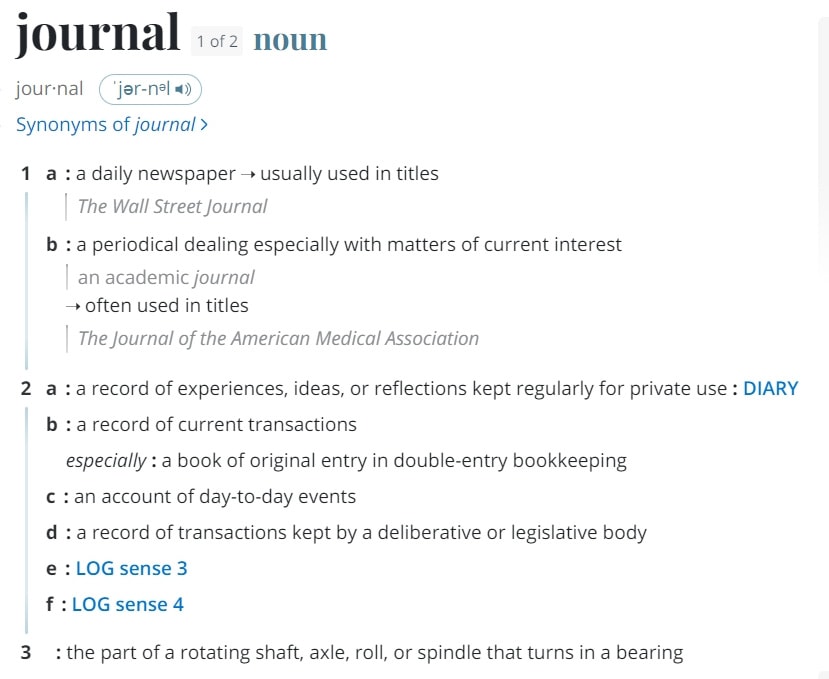
A dictionary definition of a journal might describe it as a book or document in which one records experiences, thoughts, or observations, and it may not necessarily be tied to daily entries. Journals can serve various purposes, including personal reflection, creative writing, goal setting, or recording notes. They offer a more versatile platform for recording thoughts, ideas, and information.
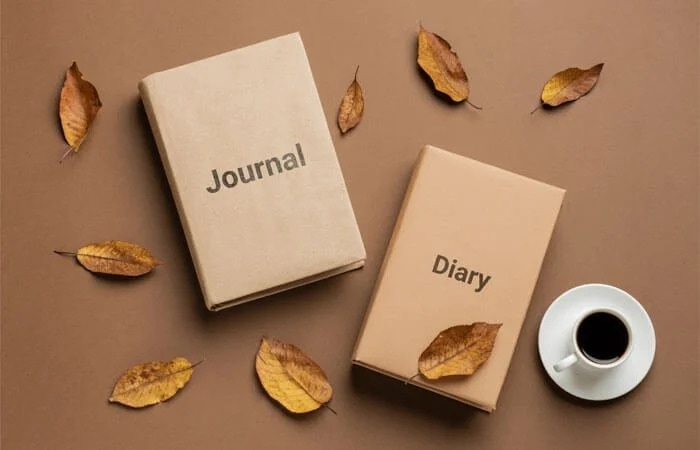
In summary, the dictionary definitions highlight that a diary is a daily record of personal experiences, whereas a journal is a broader document where one can record various types of information and is not restricted to daily entries. The key distinction is the frequency of entries and the scope of content, with diaries being more focused on daily life and emotions, while journals can encompass a wider range of writing purposes and formats.
2. The Core Differences: Diary vs Journal
Diary vs Journal, in the realm of self-expression, two frequently used terms often stand side by side. While these terms are often used interchangeably, they possess distinctive qualities that set them apart. Here are the key differences:
2.1 Purpose

Diary: A diary is typically associated with recording daily personal experiences, thoughts, and emotions. It often focuses on the events of the day, personal reflections, and feelings.
Journal: A journal can have a broader purpose. While it can serve a similar function as a diary, it may also be used for a wide range of writing purposes, including goal setting, self-improvement, creative writing, note-taking, and more. Journals can be more structured and organized for specific activities or goals.
2.2 Format
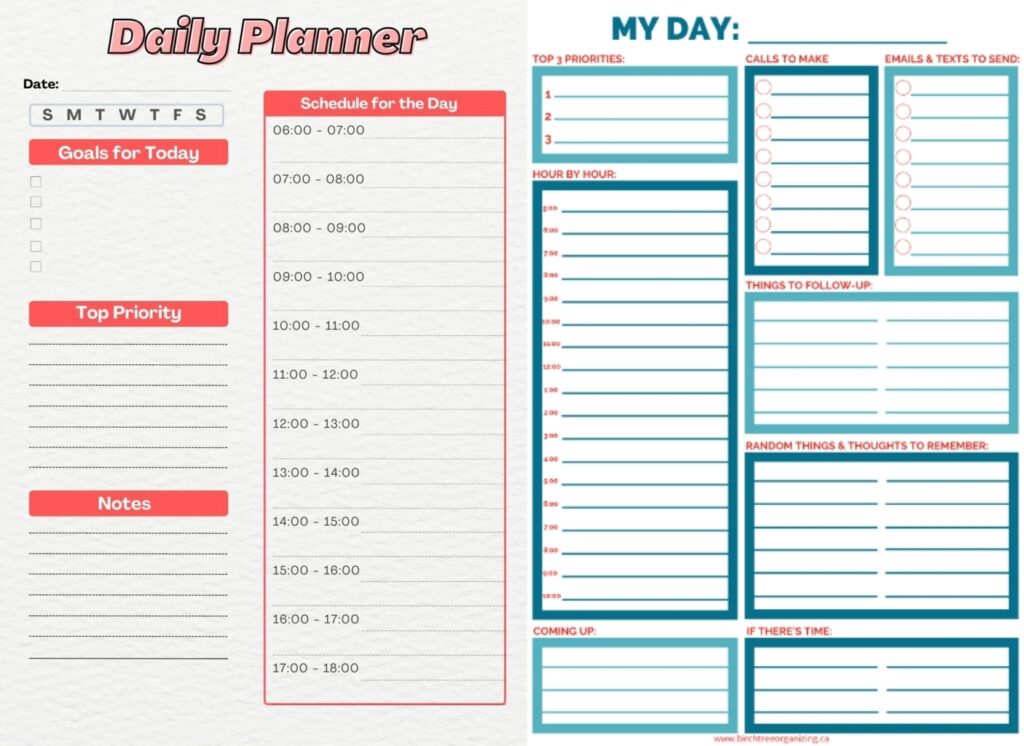
Diary: Diaries are often chronological and structured around specific dates. Entries in a diary are usually in a day-to-day format, reflecting the writer’s experiences and emotions during that specific time.
Journal: Journals may not be limited to chronological entries. They can be organized thematically or around specific topics, which allows for a more flexible approach to writing. Journal entries can span various timeframes.
2.3 Emotional Expression
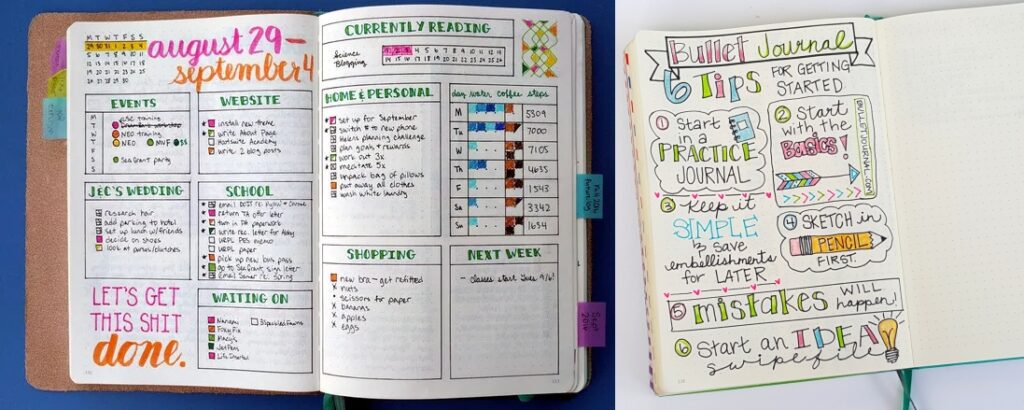
Diary: Diaries often emphasize personal emotions and feelings, making them an outlet for self-expression. Writers may use diaries to process their emotions, document their personal lives, and maintain a record of their feelings and experiences.
Journal: Journals can have a more objective or reflective tone. They may be used for a wide range of purposes, including keeping track of goals, recording thoughts on books or articles, sketching ideas, or simply taking notes. While emotions can still be a part of journaling, they are not always the primary focus. (How To Start A Reading Journal)
2.4 Privacy

Diary: Diaries are often seen as more private and personal. Many people keep diaries as a confidential space to express their innermost thoughts and emotions.
Journal: Journals can be more versatile and may include both private and public aspects. Some people use journals for public or professional purposes, such as work-related notes or creative writing, and may not mind sharing those aspects.
2.5 Structure
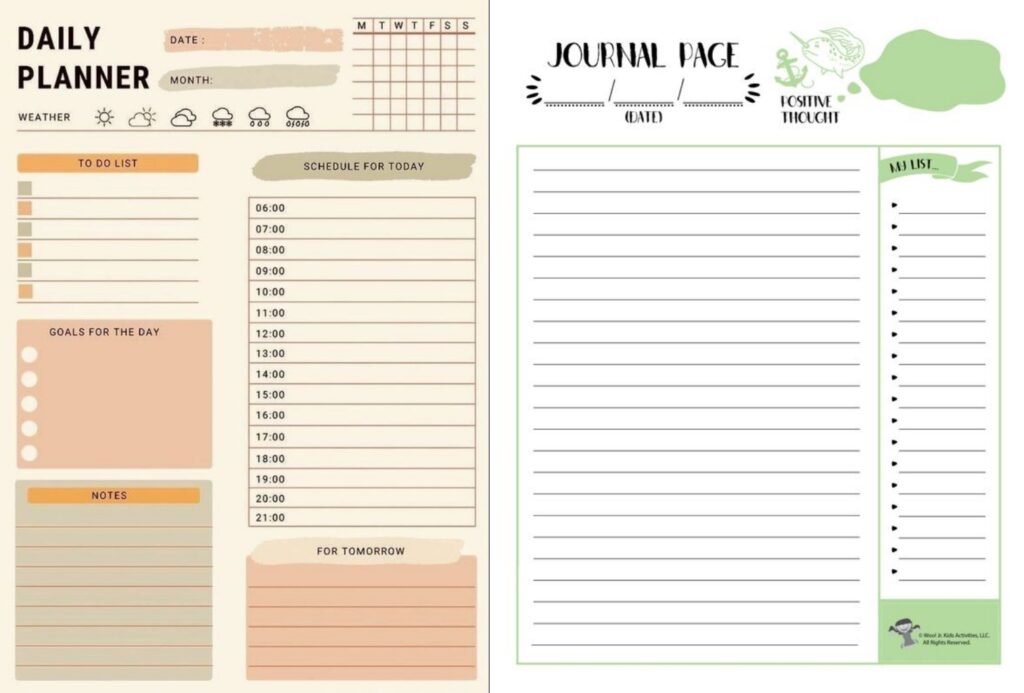
Diary: Diaries are typically more structured around daily or regular entries. They are often associated with daily routines and the practice of recording events and emotions at the end of the day.
Journal: Journals can be less structured and more adaptable. They can be used for intermittent entries and may not have a specific timeline or daily commitment.
In practice, the terms “diary” and “journal” are often used interchangeably, and the choice of terminology depends on individual preferences. Some people may prefer the emotional and personal connotations of a diary, while others may opt for the flexibility and versatility of a journal.
| Aspect | Diary | Journal |
|---|---|---|
| Purpose | Record daily personal experiences, thoughts, and emotions. | Serve various purposes, including personal reflection, creative writing, goal setting, note-taking, and more. |
| Entry Frequency | Typically daily entries, focusing on each day’s events. | Entries can vary in frequency, allowing for more flexibility. |
| Emotional Expression | Emphasizes personal emotions and feelings, providing an outlet for self-expression. | Can have a more objective or reflective tone, with a focus on various writing purposes. |
| Format | Organized chronologically, with entries usually tied to specific dates. | Can be organized chronologically, thematically, or around specific topics. |
| Privacy | Often considered more private and personal, meant for personal reflection. | Content can be more varied, with some aspects suitable for sharing or public use. |
| Content | Typically focuses on daily life, events, personal emotions, and reactions. | May include personal thoughts, goals, creative writing, notes, sketches, lists, and more. |
| Structured or Flexible | More structured with a daily routine for writing. | Offers more flexibility in terms of when and how often you write. |
| Versatility | Primarily designed for recording daily experiences and emotions. | Can be adapted for various writing goals and creative expressions. |
3. How to Write: Diary vs Journal
Writing in a diary and writing in a journal can have some similarities, but there are also differences in how you might approach each. Here are some tips on how to write in a diary and a journal:
Writing in a Diary:
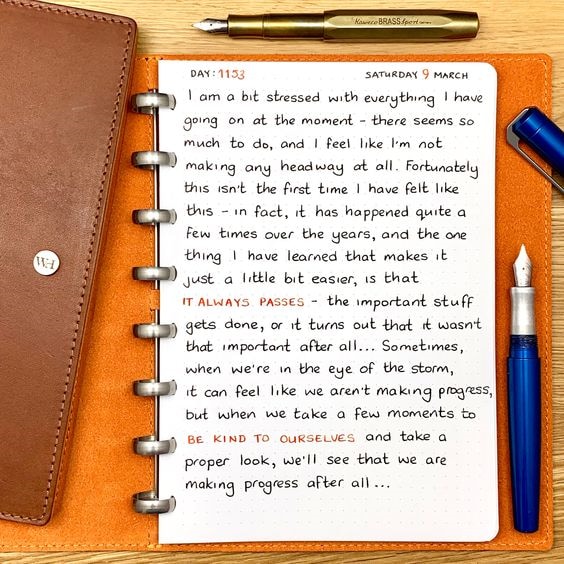
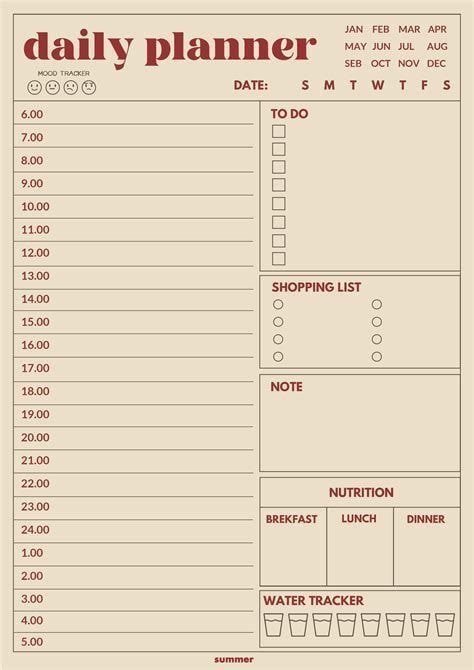
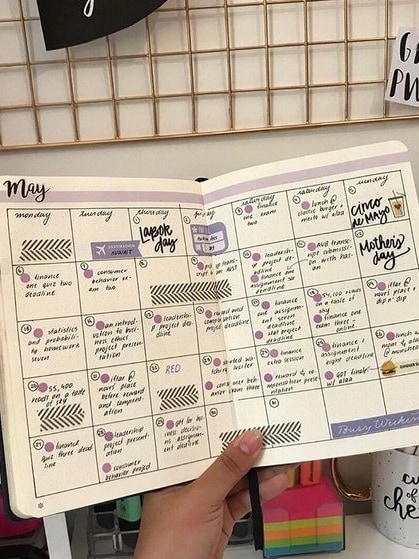
- Daily Entries: Diaries are traditionally associated with daily entries. Try to make it a habit to write in your diary at the end of each day to record your thoughts, experiences, and emotions.
- Be Personal: Diaries are a space for your most personal thoughts and feelings. Write candidly and honestly about your day, your emotions, and your reactions to events.
- Chronological Order: Diary entries are typically organized chronologically, so start with the date at the top of each entry. This helps create a timeline of your experiences.
- Emotional Expression: Use your diary to express your emotions, whether it’s happiness, sadness, anger, or excitement. Share your innermost feelings without reservation.
- Detail-Oriented: Include as many details as you can, such as the people you interacted with, the places you went, and the conversations you had. These details help you capture the essence of each day.
- Consistency: Try to be consistent with your diary writing. Regular entries will help you create a more comprehensive record of your life.
Writing in a Journal:
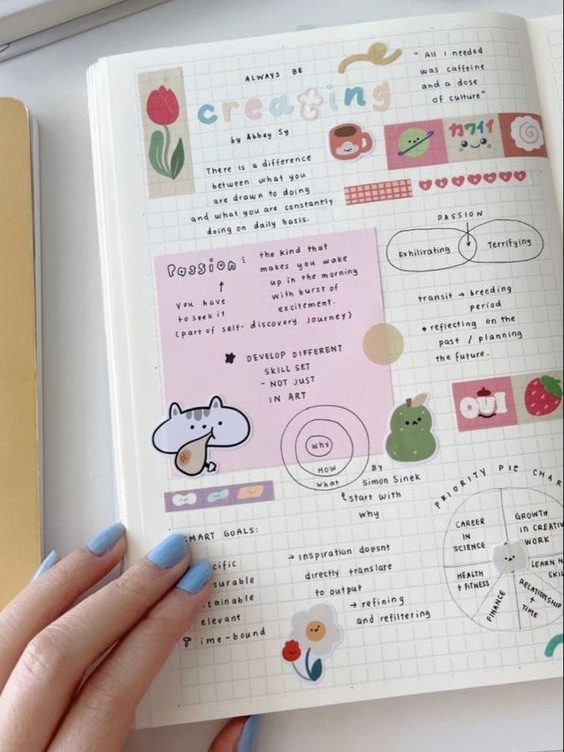
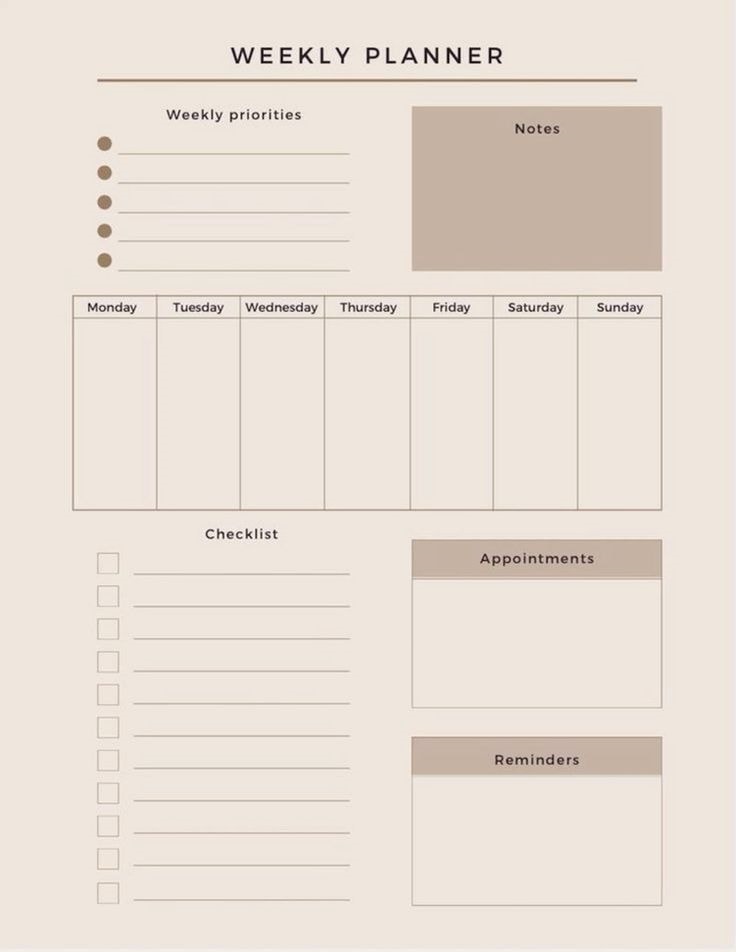

- Varied Purposes: Journals can serve various purposes beyond personal reflection. They can be used for goal setting, creative writing, note-taking, and more. Decide on the purpose of your journal before you start writing.
- Organization: Depending on your journal’s purpose, you may organize it differently. For goal setting, create a structured plan. For creative writing, explore your thoughts and ideas freely.
- Thematic or Topic-Based: Journals can be thematic or topic-based. For example, you might have a travel journal where you record your adventures or a gratitude journal where you write down things you’re thankful for.
- Flexibility: Journals offer more flexibility in terms of when and how often you write. You can write when inspiration strikes or when you have specific goals to work on.
- Mix of Content: Journals can include a mix of personal thoughts, goals, lists, sketches, quotes, and more. They are versatile spaces for creativity and exploration.
- Reflection: Regardless of the purpose of your journal, you can still include reflective elements. Write about your progress, what you’ve learned, or how your thoughts have evolved over time.
Remember that there are no strict rules for writing in a diary or a journal. Ultimately, how you write in either one is a matter of personal preference and the specific purpose you want to fulfill. Some people may use both diaries and journals for different aspects of their lives.
4. Which One Is Right For You?

Deciding whether a diary or a journal is right for you depends on your goals, preferences, and the way you want to document your experiences and thoughts. Here are some factors to consider when choosing between a diary and a journal:
Choose a Diary If:
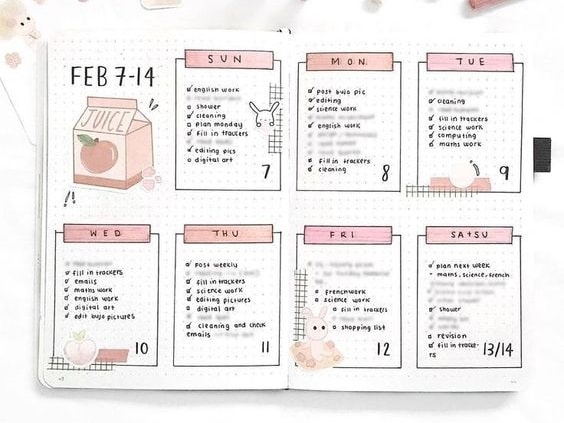
- You Want to Record Daily Life: If your primary goal is to create a chronological record of your daily experiences, emotions, and events, a diary is a suitable choice. It’s great for capturing the day-to-day details of your life.
- You Seek Emotional Catharsis: Diaries are ideal for expressing and processing your emotions. If you want a safe and private space to vent, reflect, and explore your feelings, a diary is a natural fit.
- You Prefer Routine: Diaries are typically used for daily entries, so if you thrive on routine and structure, a diary can help you establish a regular writing habit.
- You Value Personal Privacy: Diaries are often considered more private and personal. If you want to keep your thoughts and emotions confidential, a diary is a better choice.
Choose a Journal If:
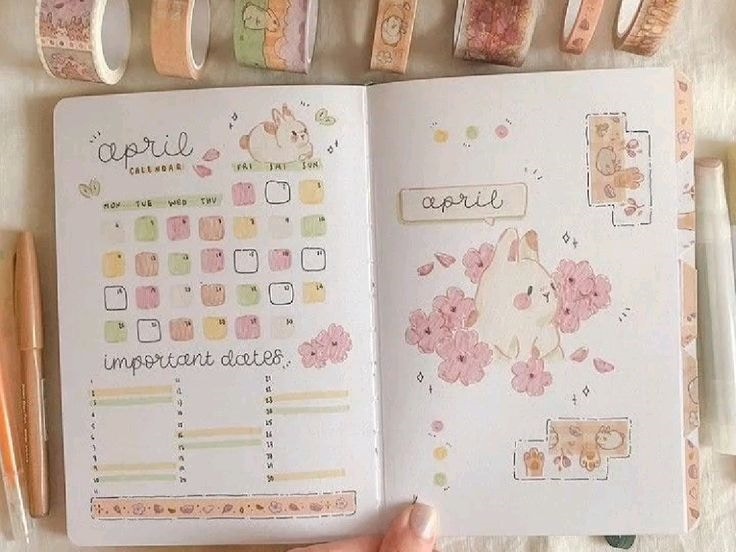
- You Have Diverse Writing Goals: Journals are versatile and can be tailored to various purposes. If you want to set and track goals, engage in creative writing, take notes, or explore specific topics, a journal is a more flexible option.
- You Want to Explore Different Formats: Journals can include a mix of written content, sketches, lists, and more. If you prefer a diverse range of media and formats for self-expression, a journal can accommodate that.
- You Don’t Want to Be Tied to Daily Entries: Journals allow you the freedom to write as often as you like, without the pressure of daily entries. You can write when inspiration strikes or when you have specific goals in mind.
- You Seek Flexibility: Journals offer more freedom to adapt to your changing needs and interests. You can switch between different types of journals (e.g., travel journals, gratitude journals) based on what’s relevant at the time.
- You Are Open to Sharing: Depending on your journal’s content, you may be more open to sharing it with others or using it for professional or public purposes, such as work-related notes or creative projects.
Ultimately, the choice between a diary and a journal is a matter of personal preference. You can also choose to use both, depending on your needs and interests. Some people find value in keeping a personal diary for emotional expression and a separate journal for other aspects of their lives. The key is to select the option that aligns best with your goals and how you want to document your experiences and thoughts.
5. FAQ
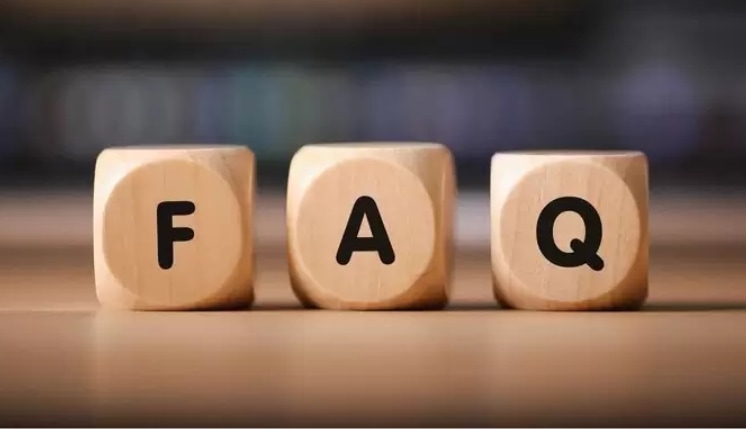
Q: How can I customize a diary or a journal?
You can search for customized services in numerous online stores. Honeyoung, as a notebook manufacturer, can fulfill your customized needs.
Q: How often should I write in my diary or journal?
It’s entirely up to you. Some people write daily, while others do so weekly or when they feel the need.
Q: Can children benefit from keeping a diary or journal?
Yes, children can also benefit from these practices. It can help with emotional expression and cognitive development.
Q: Are there any specific journaling techniques to follow for personal growth?
There are various journaling techniques, such as gratitude journaling and morning pages, that can enhance personal growth and self-improvement.
Q: How should I choose a notebook?
You can choose notebooks of different sizes based on your purpose. (Notebook Sizes: The Ultimate FAQ Guide)
Q: Can I keep a diary and a journal simultaneously?
Absolutely! Many people find value in maintaining both, as they serve different needs. A diary captures daily life, while a journal provides a space for deeper introspection.
Q: Can I use a digital diary or journal instead of a physical one?
Certainly. In today’s digital age, many opt for digital formats. The choice between physical and digital depends on your personal preference.
Q: Are there any famous diarists or journal keepers I can look up to for inspiration?
Absolutely. Famous diarists like Anne Frank and Samuel Pepy, and journal keepers like Virginia Woolf, offer inspiration and insight into the world of personal writing.

